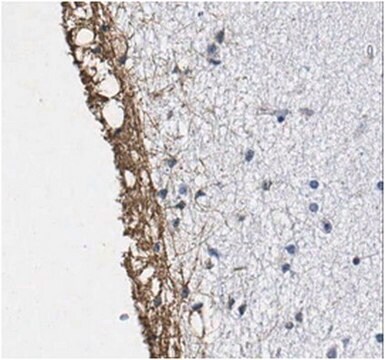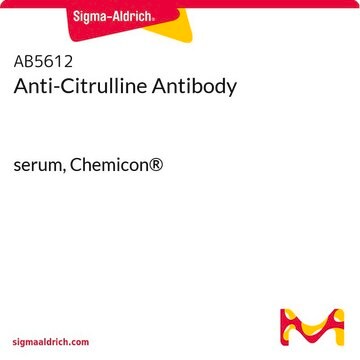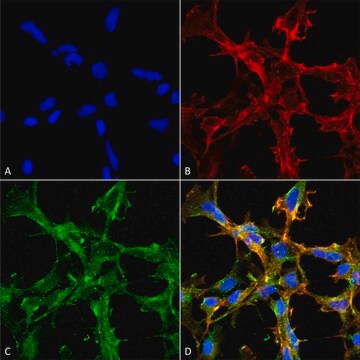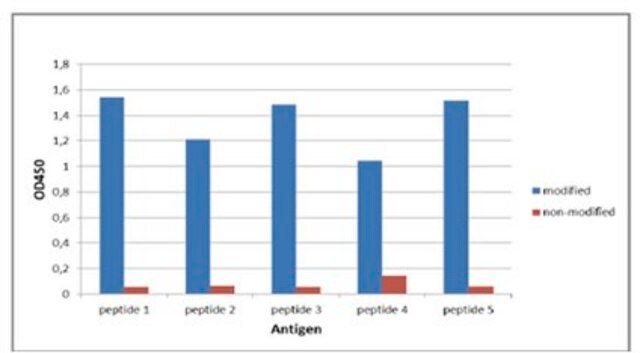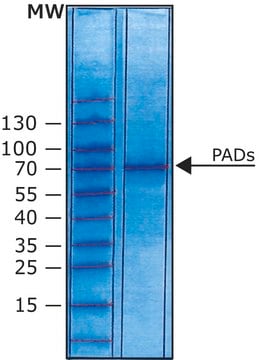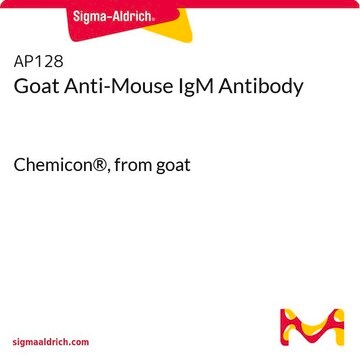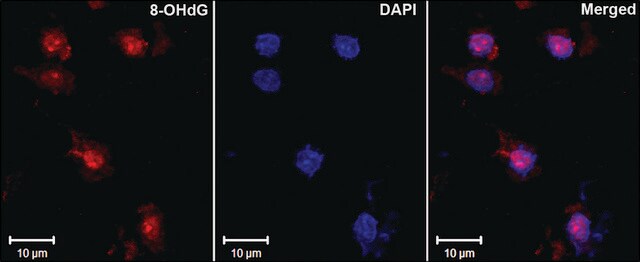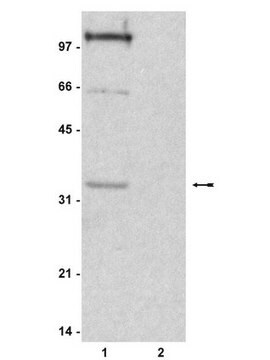추천 제품
생물학적 소스
rabbit
Quality Level
항체 형태
affinity isolated antibody
항체 생산 유형
primary antibodies
클론
polyclonal
정제법
affinity chromatography
종 반응성
human, vertebrates, mouse
제조업체/상표
Upstate®
기술
immunohistochemistry: suitable
western blot: suitable
동형
IgG
배송 상태
wet ice
타겟 번역 후 변형
unmodified
일반 설명
The amino acid Citrulline is required to detoxify the liver from ammonia, which is a waste product of the body from oxidation. Citrulline promotes energy and assists with the immune system. This unusual amino acid is formed in the urea cycle by the addition of carbon dioxide and ammonia to ornithine. It is then combined with aspartic acid to form arginosuccinic acid, which later is metabolized into the amino acid arginine.
특이성
Multiple deiminated keratins in human cornified skin. Thought to react preferentially with citrulline residues in glycine rich contexts.
면역원
Linear peptide containing Citrulline.
애플리케이션
Detect Citrulline with Anti-Citrulline Antibody (Rabbit Polyclonal Antibody), that has been shown to work in WB & IHC.
Research Category
Inflammation & Immunology
Inflammation & Immunology
Research Sub Category
General Post-translation Modification
General Post-translation Modification
품질
routinely evaluated by immunoblot in whole cell lysates from tape-stripped human outer cornified layers
표적 설명
43-65 kDa
물리적 형태
25mM Tris/Tris-HCl, pH 7.4, 137mM NaCl,2.7mM KCl, 0.02% sodium azide before the addition of glycerol to 30%
ImmunoAffinity Purified
저장 및 안정성
Stable for 1 year at 2-8°C from date of receipt.
분석 메모
Control
Human outer cornified layer whole cell lysate
Human outer cornified layer whole cell lysate
법적 정보
UPSTATE is a registered trademark of Merck KGaA, Darmstadt, Germany
면책조항
Unless otherwise stated in our catalog or other company documentation accompanying the product(s), our products are intended for research use only and are not to be used for any other purpose, which includes but is not limited to, unauthorized commercial uses, in vitro diagnostic uses, ex vivo or in vivo therapeutic uses or any type of consumption or application to humans or animals.
적합한 제품을 찾을 수 없으신가요?
당사의 제품 선택기 도구.을(를) 시도해 보세요.
Storage Class Code
10 - Combustible liquids
WGK
WGK 1
시험 성적서(COA)
제품의 로트/배치 번호를 입력하여 시험 성적서(COA)을 검색하십시오. 로트 및 배치 번호는 제품 라벨에 있는 ‘로트’ 또는 ‘배치’라는 용어 뒤에서 찾을 수 있습니다.
Hans-Georg Kopp et al.
The Journal of clinical investigation, 116(12), 3277-3291 (2006-12-05)
Thrombopoietic cells may differentially promote or inhibit tissue vascularization by releasing both pro- and antiangiogenic factors. However, the molecular determinants controlling the angiogenic phenotype of thrombopoietic cells remain unknown. Here, we show that expression and release of thrombospondins (TSPs) by
Yi-Fang Yang et al.
Cellular & molecular biology letters, 27(1), 19-19 (2022-03-04)
Peptididylarginine deiminase type 2 (PADI2) catalyzes the conversion of arginine residues to citrulline residues on proteins. We demonstrate that PADI2 induces T cell activation and investigate how PADI2 promotes activated T cell autonomous death (ACAD). In activated Jurkat T cells
A Ishida-Yamamoto et al.
The Journal of investigative dermatology, 114(4), 701-705 (2000-03-25)
Citrulline-containing proteins, mainly originating from keratin K1 and formed by enzymatic deimination of arginine residues, have been identified in the cornified layers of human epidermis. We analyzed the localization and nature of the deiminated proteins in psoriatic epidermis. Immunostaining based
T Senshu et al.
Journal of dermatological science, 21(2), 113-126 (1999-10-08)
Citrulline residues are detected in keratins and filaggrin in the cornified layers of mammalian epidermis. Such citrulline residues are formed by the enzymatic deimination of arginine residues by peptidylarginine deiminases (EC 3.5.3.15). Major deiminated keratins are derived from keratin K1.
T Senshu et al.
Biochemical and biophysical research communications, 225(3), 712-719 (1996-08-23)
The upper layers of mammalian epidermis contain citrulline-containing proteins formed by enzymatic deimination of arginine residues. To study the role of protein deimination in epidermal differentiation, we identified deiminated proteins extracted from human epidermis. Major deiminated proteins were identified as
자사의 과학자팀은 생명 과학, 재료 과학, 화학 합성, 크로마토그래피, 분석 및 기타 많은 영역을 포함한 모든 과학 분야에 경험이 있습니다..
고객지원팀으로 연락바랍니다.